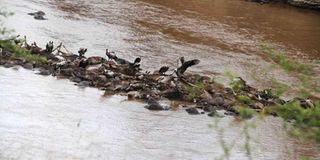Concern raised on the decline in Kenya's vulture numbers

Vultures feed on a section of hundreds of Wildebeest that drowned on Sunday afternoon.
What you need to know:
- The birds are under severe threat globally.
The vultures emerged from their nestled cliff hideout in the hilly part of Hells Gate National Park in Naivasha before circling the skies in a synchronised manner.
The rainbow appeared as the sun emerged, adding to the thrilling spectacle, as awed spectators captured the moment with their phones, careful not to miss a moment. This was the scenario during the International Vultures Awareness Day on Saturday.
The birds, commonly referred to as “nature’s garbage disposers”, are under severe threat globally. In a speech read on his behalf by Wildlife Principal Secretary Fred Segor, Tourism Cabinet Secretary Najib Balala termed the decline of vultures as “worrying.”
“At least 61 percent of the birds are lost due to poisoning, with 29 per cent killed for traditional medicine. Nine percent due to electrical infrastructure and one per cent killed for food,” he noted, saying herders who poison livestock carcases to kill lions and other predators inadvertently kill vultures as well.
“Vultures often fall prey as collateral damage. Two, poachers poison vultures as they are usually the first to locate the carcass and circle above the dead animal. This pinpoints authorities to the poached animals and in revenge, the poachers poison the birds,” he said.
The CS revealed that there are eight species of vultures in Kenya, with four categorised as “critically endangered”, two “endangered”, one “near threatened”, and the last one is of “least concern”.
Mr Balala called for the education of communities living around conservation areas on the importance of vultures to the ecosystem. This, he said, will create awareness and reduce wildlife poisoning, so that the number of the vultures can rise.
Kenya Wildlife Senior researcher Joseph Edebe cited the white-backed vulture among the endangered species, the white-headed and hooded vultures as critically endangered.
He noted that KWS was working with the Kenya Electricity Generating Company (KenGen) and Kenya Electricity Transmission Company (Ketraco) to help in the conservation efforts.
“We have clearly mapped out biodiversity hotspots to help minimise the dangers,” said Mr Edebe.
Also present was Tourism Principal Secretary Safina Kwekwe.





